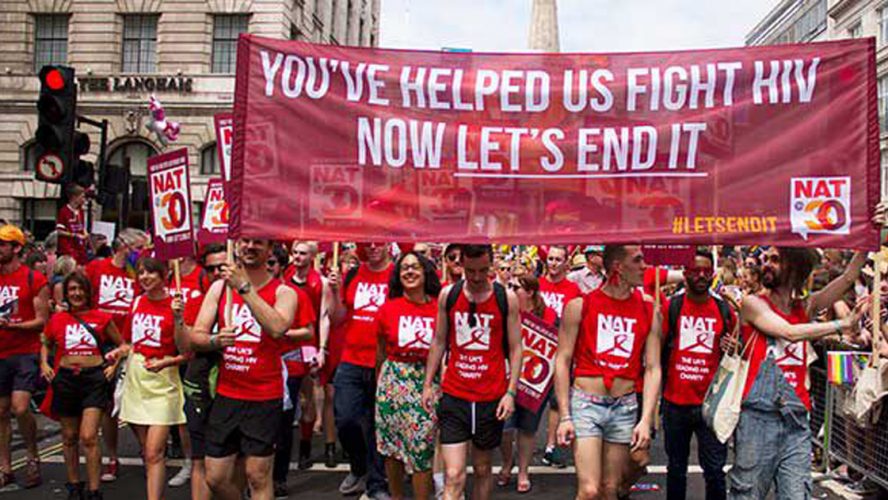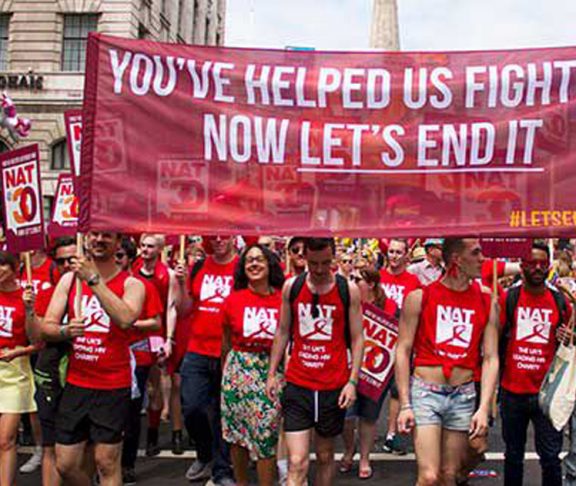
Deborah Gold
Chief Executive, NAT (National AIDS Trust)
Deborah Gold, the Chief executive of the National AIDS Trust looks back at 30 years of progress, and describes our current situation.
How has treatment progressed in the 30 year epidemic?
“Treatment has progressed tremendously. We now have the tools we need to eradicate AIDS deaths and to stop, and begin to reverse, the spread of the epidemic. We even have a pill that can prevent HIV. Treatment technology has improved so that many people living with HIV experience no, or limited side-effects.”
What’s the current prognosis if you are diagnosed with HIV?
“Now, if diagnosed early, someone diagnosed with HIV can expect a normal lifespan and good health. However the later the infection is diagnosed, the worse the health outcomes, and very late diagnosis is still linked to poor health and early death.
“People living with HIV face stigma at home, in public, at work or school and even in healthcare settings. There remain strong links between HIV and poor mental health, and poverty – links that need to be broken. That’s why this World AIDS Day we are saying #LetsEndIt, focussing not only on ending HIV transmissions but also the stigma and isolation all-too-often experienced by those with the diagnosis.”
Is there anything more to do in HIV treatment research?
“There is a lot of potential in technologies such as long-acting antiretrovirals. This would allow patients to be relieved of daily pill burden and instead be treated with injections, needed much less often.
“Having to treat HIV less often has the potential to improve adherence to treatment and early indications show that there is an appetite for this in-patient groups. And of course, there is a continued need for research into an eventual cure for those already living with HIV.”
What are treatment outcomes like in the UK?
“Treatment outcomes in the UK are among some of the best internationally, however people living with HIV face new frontiers. As the first generation reach old age having survived HIV, they face a greater likelihood of co-morbidities and a social care system which is not yet familiar with HIV. There is more work to do to support those in the social care system, and we are focusing on this at NAT.
“Good treatment outcomes need to be experienced by all communities, and we also focus on that as a priority.
“For example, our early research has shown that misgendering and low knowledge of trans people’s needs from health care workers has lead to disengagement from care, and therefore poorer health outcomes. We need systemic change to improve the quality of care for trans people so that they are as able to access sexual health testing and treatment as anyone else.”
Is HIV care only about antiretroviral medication?
“We must go beyond seeing viral suppression as the be-all and end-all of HIV treatment. Of course, ensuring people living with HIV are virally supressed is crucial for health outcomes and for prevention efforts.
“Viral suppression cannot however be seen in isolation from other factors of treatment and support. This year we released our report Why We Need HIV Support Services, which shed light on how HIV support services underpin and support medical treatment. Specialised support services provide interventions such as peer support, advice and information services, self-management education.”
How much are services costing?
Services like this are a lifeline to many people living with HIV. They are not just a bonus to add to clinical care, rather they mutually support and complement one another; 50% of attendees at expert patient groups subsequently reported fewer GP visits.
For an investment of £400 per attendee, there was an average net saving to the NHS for each patient with a long-term condition of £1,800.
Despite the expertise developed over the past three decades, and the cost-effectiveness of providing them, support services across the UK face significant funding cuts and many are closing. See our website stopHIVcuts.org for more details.

